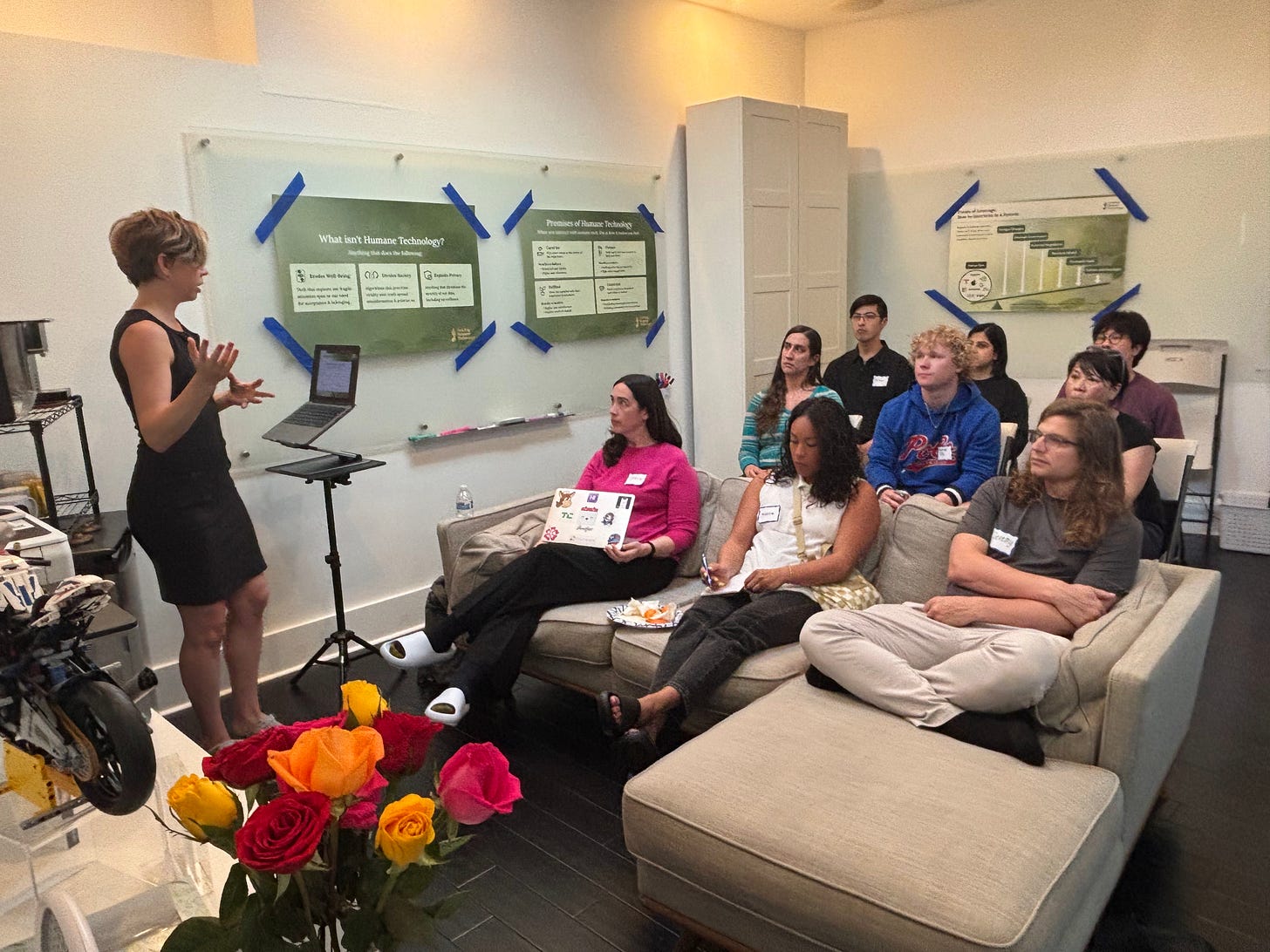Building Humane Tech together
Measuring impact at our inaugural Builders Cohort
Yesterday marked a meaningful step in our shared journey to create technology that respects and uplifts our humanity. We gathered for the inaugural Builders Cohort event in San Mateo—an evening focused on real demos, engaged questions, and practical steps toward building more human-centered tools.
Starting with vision
We began around the firepit with a grounding question: "What’s your vision for humanity and technology? What do you want to see in the world, even if it feels impossible?" From expanding our emotional range to challenging extractive systems, the reflections set a tone of thoughtful hope. People weren’t just attending—they were arriving, ready to listen, question, and contribute.
As we moved indoors, I turned a new leaf: instead of my trusty post-its, I showed a deck. With support from Storytell, I introduced a new framework we’re prototyping—one that evaluates technology not just by what it does, but by how it makes us feel.
From idea to application: Two live demos
This first cohort featured two builders demoing projects shaped by humane tech principles in very different ways.
UON: Authentic in-person connection
Luis Contreras, founder & CEO, introduced us to UON ("you on?"), an app designed to foster presence and consent-based connection in shared public spaces. The question behind it is simple: what if people could opt in, fully and voluntarily, to being open for connection right where they are?
UON flips the typical social platform model. You’re invisible until you turn yourself on. There’s no ambient surveillance, no algorithmic matchmaking. Just people choosing to be available.
Luis shared that at early events, users didn’t just meet one-on-one—they began forming spontaneous community clusters. One person from the LGBTQ+ community told him that UON offered a safer way to connect: fewer unknowns, lower risk.
With post-event match options, location-based visibility, and a clear opt-in model, the app is still in beta but already surfacing a powerful question: what happens when digital tools respect our boundaries instead of bypassing them?
Agenda Hero: Reclaiming your weekends
Caren Cioffi, co-founder & CEO, presented Agenda Hero, a calendar automation tool born from a quiet kind of pain: losing weekend time to repetitive scheduling tasks.
"I’m building an anti-productivity platform," she shared. "I don’t want people to spend more time on their computers—I want them to spend less."
Agenda Hero uses AI to turn text and PDFs into calendar events, but what stood out was the experience: a joyful interface, full editability, and a spirit of agency throughout. It’s not just tech that works—it’s tech that listens.
Caren’s demo resonated with the room. The problem she addressed felt familiar, and her approach was grounded and thoughtful.
Testing humane metrics in the wild
For the first time, we experimented with evaluating a demo through the lens of four humane tech metrics:
Cared for: Do you feel considered by the technology?
Present: Does it help you be here now?
Connected: Does it strengthen meaningful relationships?
Fulfilled: Does it support what matters to you?
Participants shared feedback on both demos using different approaches. UON was rated through the Scoring the Promises of Humane Tech metrics and surfaced an overall average humane score of 75.02%. For Agenda Hero, a hands-up vote gave us a quick sense of strong alignment with Cared for and Fulfilled. While not directly comparable, both sets of responses sparked useful reflection on how we measure what matters.
The metric itself is still in development. This was our first time applying it in a live setting—and we learned a lot. From refining the questions to thinking about what different scores mean in context, we’re continuing to build a feedback tool that not only surfaces insight but also aligns with the principles it aims to uphold.
A room full of builders
What made this night feel different wasn’t the format. It was the mindset. The people in the room weren’t just observing—they were building. And they brought their questions with care:
How might this scale while staying safe?
What about consent when cameras are involved?
Could this framework help us make better decisions, faster?
The energy wasn’t critique for critique’s sake. It was collaborative, values-aligned, and future-facing. It felt like the start of something we need more of.
Gratitude for our sponsor
A special thank you to UpHonest Capital for generously sponsoring our event. Their support helped make this Builders Cohort possible.
Want to demo what you’re working on?
We’re always looking for builders to share early-stage ideas, working products, or prototypes shaped by humane tech values. If you're building something that you want to share with the community and want us to evaluate from the humane tech lens, we’d love to hear from you. Fill out this form to let us know.
Where we go from here
We closed with a 3L reflection—what we liked, learned, and longed for. Among the responses:
Keep evolving the metrics framework
Make room for more in-progress demos
Strengthen our community between sessions (Slack invites are coming soon!)
The next Builders Cohort is on May 14. Whether you’re building something or just hungry to be part of this kind of space, we hope you’ll come. Because in the end, humane technology isn’t a product category. It’s a practice. And it’s one we’re learning to walk together.






